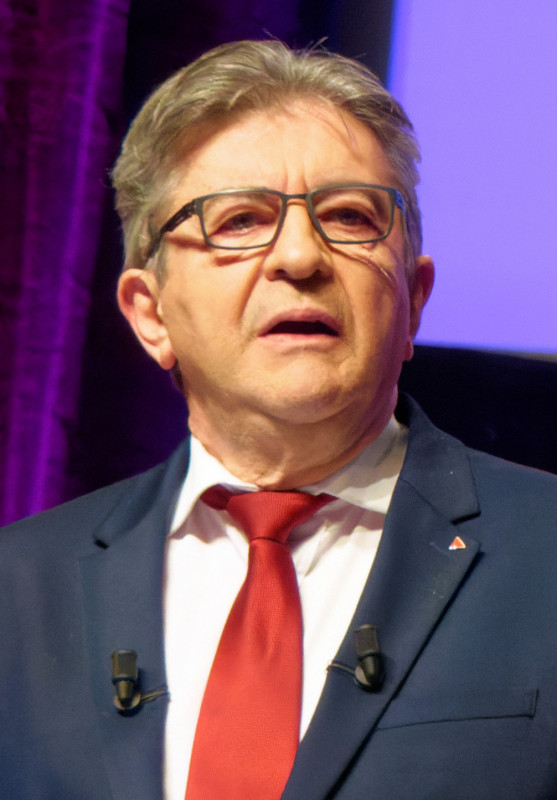Jean-Luc Mélenchon is a prominent French politician, currently the leader of La France Insoumise (LFI). He served as a deputy in the National Assembly for Bouches-du-Rhône (2017-2022) and led the LFI group there (2017-2021). Previously, he was a Member of the European Parliament (2009-2014). Mélenchon has run for President of France three times (2012, 2017, 2022), coming close to reaching the second round in 2022. He is a significant figure in French left-wing politics.
1945: Biggest vote in France
With seven million votes in 2017, La France Insoumise had achieved the biggest vote in France for the radical left since 1945.
August 1951: Birth of Jean-Luc Mélenchon
In August 1951, Jean-Luc Antoine Pierre Mélenchon was born. He is a French politician and the de facto leader of La France Insoumise (LFI) since 2016.
1968: Protests
He saw Mitterand's win in 1981 as the end of a political process of which the main accelerator was "the ten million workers on strike" in the protests of 1968.
1968: Warsaw Pact invasion of Czechoslovakia
In 1968, the Warsaw Pact invasion of Czechoslovakia had significantly affected Mélenchon in political terms.
1972: Graduated
In 1972, Mélenchon graduated.
1972: Joining Internationalist Communist Organisation
In 1972, Mélenchon joined the Internationalist Communist Organisation.
September 1976: Joined the PS
In September 1976, Mélenchon joined the PS.
1976: Joined the Socialist Party
In 1976, Mélenchon joined the Socialist Party (PS).
1981: First secretary of the Essonne federation
At the Valence Congress in 1981, Mélenchon was appointed as the first secretary of this federation; he remained in this position until 1986.
1981: Georges Marchais
It was the first time the non-socialist left had registered a double figure result since Georges Marchais in 1981.
1983: Municipal Councillor of Massy
In 1983, Mélenchon was elected as a municipal councillor of Massy.
1985: General Councillor of Essonne
In 1985, Mélenchon was elected as a general councillor of Essonne.
1986: Entered the Senate
In 1986, Mélenchon entered the Senate.
1994: Mitterrand's Declaration on WWII
In 1994, former president François Mitterrand declared that the round-up and deportation of Jews to death camps during World War II was the work of the country's Nazi occupiers and "Vichy France", an illegitimate entity distinct from France. The event is mentioned in the context of Mélenchon's similar comments in 2017.
1995: Reelected to the Senate
In 1995, Mélenchon was reelected to the Senate.
1997: Unconditionally supported the Plural Left
Jean-Luc Mélenchon unconditionally supported the Plural Left that was in power between 1997 and 2002.
2000: Minister for Vocational Education
Between 2000 and 2002, Mélenchon served as Minister for Vocational Education.
2000: Minister in the government
Jean-Luc Mélenchon was a minister in the government between 2000 and 2002.
2002: End of term as Minister
Between 2000 and 2002, Mélenchon served as Minister for Vocational Education.
2002: Reference to Attack on Paul Voise
In 2002, Mélenchon referenced the attack on retiree Paul Voise before the presidential election as an example of events used for political gain.
2002: Refusal to endorse Macron
In 2002, after the first round of elections, Jean-Luc Mélenchon refused to endorse Emmanuel Macron. He told his voters that no votes should go to the National Front, as he had done in 2002.
2002: Supported the Plural Left
Jean-Luc Mélenchon unconditionally supported the Plural Left that was in power between 1997 and 2002.
2004: Reelected to the Senate
In 2004, Mélenchon was reelected to the Senate.
2005: French European Constitution referendum
Mélenchon created the political current Trait d'union after the victory of the "No" in the 2005 French European Constitution referendum.
September 2008: Reims Congress
At the Reims Congress in September 2008, Mélenchon made a new contribution.
November 2008: Left the Socialist Party
In November 2008, Mélenchon left the Socialist Party (PS) after the Reims Congress to found the Left Party.
November 2008: Decision to leave the PS
On 7 November 2008, Mélenchon, alongside Marc Dolez, announced their decision to leave the PS, and to create a new movement "without concession facing the right".
2008: Departure from the Socialist Party
In 2008, Jean-Luc Mélenchon departed from the Socialist Party after being a member for almost thirty years. He began a companionship with the French Communist Party.
2009: Elected as MEP
Before the 2009 European Parliament election in France, Mélenchon joined the electoral coalition of the Left Front. He was elected as a MEP in the South-West France constituency.
2009: Member of the European Parliament
In 2009, Mélenchon was elected as a Member of the European Parliament (MEP).
2012: Criticism of economic globalization
During his 2012 campaign, Jean-Luc Mélenchon positioned himself against economic globalization, which he said disproportionately profited the financial industry and high-income earners at the expense of the poor.
2012: Reference to Toulouse Jewish School Attack
In 2012, Mélenchon cited the Jihadist attack against a Jewish school in Toulouse by Mohammed Merah before the presidential election as a politically exploited event.
2012: French legislative election
In the 2012 French legislative election, Mélenchon represented the Left Front in the Pas-de-Calais' 11th constituency against his rival Marine Le Pen. He received third place with 21.46% of the vote, narrowly edged out for second by Socialist Party member Phillip Kemel.
2012: Attendance before the 2012 presidential election
Jean-Luc Mélenchon's attendance before the 2012 presidential election was at 63%.
2013: Mélenchon's Comments on Pierre Moscovici
In 2013, Mélenchon referred to French Finance Minister Pierre Moscovici as "one of those 17 Eurogroup bastards" putting pressure on Cyprus, and stated Moscovici thinks only in the language of international finance, leading to accusations of using vocabulary reminiscent of the 1930s.
August 2014: Mélenchon Criticizes CRIF
In August 2014, during a speech in Grenoble, Mélenchon criticized the Representative Council of Jews of France (CRIF), saying "We’ve had enough of CRIF. France is the opposite of aggressive communities that lecture to the rest of country." He also stated "We do not believe that any people is superior to another."
September 2014: Article in Le Monde
On September 14, 2014, Jean-Luc Mélenchon wrote in Le Monde that "France must protect itself from the powers of finance... To this end, the definition of the constitutional rights of private ownership of capital should change."
December 2014: Response to Angela Merkel's comments
In December 2014, after German Chancellor Angela Merkel described reform efforts in France and Italy as "insufficient", Jean-Luc Mélenchon replied via Twitter, telling her to take care of her own country's problems.
2014: Mélenchon on Russia's Annexation of Crimea
In 2014, Mélenchon stated that Russia's annexation of Crimea was "absolutely predictable" because Crimean ports were vital to Russia's security, and Russia was taking "protective measures against an adventurous putschist power". He also alleged Ukraine was influenced by neo-Nazis and opposed sanctions against Russia.
2014: Reelected as MEP
In 2014, Mélenchon was reelected as a Member of the European Parliament (MEP).
2014: Co-president of the Left Party
Until 2014, Mélenchon held the position of co-president alongside Martine Billard.
2014: Co-president
Until 2014, Mélenchon was co-president alongside Martine Billard.
May 2015: Pamphlet against German policies
In May 2015, after writing a pamphlet against German policies, Jean-Luc Mélenchon declared his aim was to rid readers of fascination with the "German model".
July 2015: Comments on the Greek bailout referendum
In early July 2015, regarding the Greek bailout referendum, Jean-Luc Mélenchon stated that the "right-wing German government" was primarily responsible for aggravating the crisis.
2015: Mélenchon's View on Ukraine
In 2015, Mélenchon referred to Ukraine as a country "struggling to be one".
June 2016: Mélenchon Criticizes European Hypocrisy on Venezuela
During a European Parliament session on June 8, 2016, Mélenchon criticized European hypocrisy regarding Venezuela, comparing European tolerance of Saudi Arabian rule and intolerance of Venezuelan rule.
June 2016: Mélenchon Criticizes Saudi-led Intervention in Yemen
In June 2016, Mélenchon criticized the Saudi-led intervention in the Yemeni civil war and the Macron government's support for the war effort of Saudi Arabia and the United Arab Emirates.
November 2016: Mélenchon Defames Journalist
In November 2016, Mélenchon called a Le Monde journalist a reformed assassin and a CIA muse on his blog, leading to a conviction for public defamation in 2021.
2016: Leader of La France Insoumise
In 2016, Jean-Luc Mélenchon became the de facto leader of La France Insoumise (LFI).
January 2017: Secured 500 elected sponsors
On 12 January 2017, Mélenchon secured the 500 elected sponsors required to be validated by the Constitutional Council.
June 2017: Election to the National Assembly
In June 2017, Jean-Luc Mélenchon became a member of the National Assembly for La France Insoumise after winning the legislative election in the 4th constituency of Bouches-du-Rhône. He secured 59.9% of the vote in the second round, defeating En Marche! candidate Corrine Versini.
July 2017: Mélenchon on French Guilt in the Holocaust
In July 2017, Mélenchon maintained that Republican France bears no guilt in the Holocaust, and criticised Emmanuel Macron for admitting that Vichy France was the legal French government at the time, thus conceding the French State's responsibility in the deportation of the Jews.
2017: Main representative of the historical French left
According to historian Jean-Numa Ducange, Mélenchon became the main representative of the historical French left during the 2017 presidential election, scoring 20%.
2017: Deputy in the National Assembly
In 2017, Jean-Luc Mélenchon became the deputy in the National Assembly for the 4th constituency of Bouches-du-Rhône.
2017: Publication of L'Avenir en commun
In 2017, Jean-Luc Mélenchon's party manifesto titled L'Avenir en commun stated that "The new constitution that France needs must be radically different."
2017: Polling numbers surged
In 2017, Jean-Luc Mélenchon's polling numbers surged in the final weeks of campaigning, putting him within chance of making the second round. In 2017, 21.4% had been enough to gain access to the second round.
2017: Mélenchon Calls for French Withdrawal from NATO Command
In 2017, Mélenchon called for French withdrawal from the integrated command of NATO.
2017: Reference to Paris Terrorist Attack
In 2017, Mélenchon referenced the terrorist attack in Paris before the presidential election as an example of events used for political purposes.
2017: Presidential and Legislative Elections
In 2017, Mélenchon stood as a candidate in the French presidential election, coming in fourth. He then became a member of the National Assembly for LFI following the French legislative election.
2017: Examination of the 2017 Labour Law bill
In 2017, during the examination of the 2017 Labour Law bill, Mélenchon was remarked in the National Assembly for his multiple interventions, defending the Labour Code status quo, arguing that flexibilisation would be harmful to workers. He also drew attention for denouncing a student benefits cut planned by the government.
2017: Attendance in 2017
The website votewatch.eu reported Jean-Luc Mélenchon's attendance in 2017 at 85.1%.
March 2018: Mélenchon at Mireille Knoll's Memorial March
In March 2018, following the murder of Mireille Knoll, CRIF leadership requested Mélenchon stay away from a march in her memory; despite the appeal, he was booed and abused by protesters when he attended.
2018: Mélenchon on Venezuelan Presidential Election
In 2018, Mélenchon described the countries that denounced the 2018 Venezuelan presidential election as "puppets of the United States". He stated the election date was agreed upon with the approval of former Spanish Prime Minister José Luis Rodríguez Zapatero.
2018: Mélenchon Mocks Journalist's Accent
In 2018, Mélenchon mocked a journalist from Toulouse, Véronique Gaurel, for her accent during an anti-corruption investigation question, sparking a debate about discrimination based on regional accents. He later apologized.
November 2019: Mélenchon Accuses CRIF of Sectarianism
In November 2019, Mélenchon accused CRIF of practising "blatant, violent, and aggressive sectarianism, namely against me", after it asked him not to attend the memorial ceremony for Mireille Knoll more than 18 months earlier.
December 2019: Mélenchon on Jeremy Corbyn and Antisemitism Accusations
In December 2019, Mélenchon deplored that Labour Party leader Jeremy Corbyn gave in to the accusations of antisemitism in his party, blaming influence networks linked to Likud.
2019: Mélenchon on UK Election and Israeli Likud Party
In 2019, after Jeremy Corbyn and the Labour Party lost the UK general election, Mélenchon claimed the results were influenced by the Israeli Likud Party.
2019: Mélenchon on Turkish Offensive in Syria
In 2019, in response to the Turkish offensive into north-eastern Syria against the Kurdish-led Syrian Democratic Forces, Melenchon tweeted that Turkish footballers doing the military salute should be treated as soldiers of an enemy army, advocating for a boycott of football games against them.
2020: Mélenchon on Jesus and the French Police
In 2020, while interviewed about the French police, Mélenchon said: "I don't know if Jesus was on a cross, but he was apparently put there by his own people." This declaration was condemned by the Wiesenthal Center.
June 2021: Prediction of a "grave incident or murder"
In June 2021, Jean-Luc Mélenchon predicted that a serious incident or murder would occur during the last week of the 2022 presidential campaign, blaming Muslims to incite civil war. He referenced past events in 2002, 2012, and 2017 to support his claim.
October 2021: Mélenchon Accused of Antisemitism Again
In October 2021, Mélenchon was again accused of antisemitism after he claimed Jewish tradition was opposed to assimilation, and that far-right Éric Zemmour's position on immigration was rooted in this opposition.
December 2021: Campaign Rally in December 2021
During a campaign rally in December 2021, Jean-Luc Mélenchon told his supporters: "Whatever one's gender, colour or religion, we are called upon to love one another, and so we pool together our tastes and our cultures. That's créolisation. Créolisation is the future of humanity."
2021: Mélenchon's Stance During the Russo-Ukrainian Crisis
During the 2021-2022 Russo-Ukrainian crisis, Mélenchon stated that Russia "must not cross Ukraine's borders", while asserting that the United States should not "annex Ukraine into NATO". He blamed NATO for pushing closer to Russia's borders.
2021: Led La France Insoumise group in the National Assembly
From 2017 to 2021, Mélenchon led the La France Insoumise group in the National Assembly.
2021: Mélenchon Found Guilty of Defamation
In 2021 Mélenchon was found guilty of public defamation after calling a Le Monde journalist a reformed assassin and a CIA muse on his blog in November 2016.
February 2022: Mélenchon Condemns Russian Invasion
In February 2022, Mélenchon condemned the Russian invasion of Ukraine.
May 2022: Led NUPES Coalition
In May 2022, Jean-Luc Mélenchon led the NUPES coalition.
June 2022: Mélenchon's Position on the Russian Invasion of Ukraine
In June 2022, Mélenchon endorsed arms deliveries to Ukraine, with the justification that "Ukraine has the right and the duty to defend itself", but opposed further French involvement, after initially opposing arms deliveries.
October 2022: Mélenchon Hosts Russian Opponents to Putin
In October 2022, Mélenchon hosted three Russian opponents to Putin: Alexey Sakhnin, Andreï Roudoï, and Elizabeta Smirnova, who are members of the "coalition of Russian socialists against the war".
2022: Mélenchon on the Russo-Ukrainian Crisis
During the 2021-2022 Russo-Ukrainian crisis, Mélenchon stated that Russia "must not cross Ukraine's borders", while asserting that the United States should not "annex Ukraine into NATO". He blamed NATO for pushing closer to Russia's borders.
2022: Shift towards a pragmatic approach
During the 2022 presidential campaign, Jean-Luc Mélenchon shifted towards a more pragmatic approach while campaigning in favor of bread-and-butter issues.
2022: Presidential Campaign Prediction
During the 2022 presidential campaign, Mélenchon predicted an incident designed to create civil unrest by blaming Muslims.
2022: Presidential Run
In 2022, Jean-Luc Mélenchon ran for President of France for the third time, coming within 1.2 percentage points of reaching the second round.
2022: 2022 French presidential election
In 2022, Jean-Luc Mélenchon was a candidate in the French presidential election. He was placed on the ballot for the 2022 French People's Primary without his consent and came third. Taubira withdrew in March and endorsed Mélenchon.
2022: Mélenchon Advocates for French Defence
In 2022, Mélenchon advocated for France assuring its own defence.
2022: Presidential and Legislative Elections
In 2022, Mélenchon ran in the French presidential election, coming in third. He then led the NUPES alliance to a second-place performance in the French legislative election.
2022: Strategy for the 2022 Presidential Election
In 2022, for the first round of the presidential election, Mélenchon's strategy was to unite left-wing anti-neoliberal parties against Emmanuel Macron. In the legislative election, Mélenchon and La France Insoumise joined the New Ecological and Social People's Union (NUPES).
2023: Dissolution of NUPES
In 2023, amid divisions, the NUPES coalition, which was led by Jean-Luc Mélenchon, dissolved.
June 2024: Rally on 14 June 2024
During a rally on June 14, 2024, Jean-Luc Melenchon stated "When I was born, one in ten French people had a foreign grandparent, now it's one in four. Consequently, those who call themselves French by origin pose a serious problem for the cohesion of society".
June 2024: Mélenchon on Antisemitism in Pro-Palestinian Demonstrations
In early June 2024, Mélenchon wrote in a blog post that antisemitism was "residual" and "absent" from pro-Palestinian demonstrations, leading to accusations that he was minimizing the increase of antisemitic acts since the beginning of the Gaza war.
October 2024: Mélenchon Calls for Palestinian Flags in Universities
On October 4, 2024, Mélenchon called for "putting Palestinian flags everywhere" in universities after October 7, in response to Patrick Hetzel calling for a "maintenance of order" on university grounds.
2024: Mélenchon Condemns Israel's Operations in Gaza
In 2024, Mélenchon condemned Israel's military operations in the Gaza Strip as "genocide" and supported South Africa's genocide case against Israel.
2024: French Legislative Election
In the 2024 French legislative election, LFI was confirmed as the largest party of the French left.
Mentioned in this timeline
Ukraine is a country in Eastern Europe the second-largest on...
The United States of America is a federal republic located...
Venezuela officially the Bolivarian Republic of Venezuela is located on...
Saudi Arabia officially the Kingdom of Saudi Arabia KSA is...
Morocco officially the Kingdom of Morocco is a North African...
World War II - was a global conflict between the...
Trending

3 minutes ago UConn Regains No. 1 Seed Projection for NCAA Tournament; Auburn's Ranking Drops

1 hour ago Mikko Rantanen absent as Leijonat seek Olympic bronze after loss to USA.

1 hour ago Aaron Judge, Bryce Harper, and Manny Machado on MLB's Hot-Seat, Insiders Say
2 hours ago Galatasaray announced Konya squad; Konyaspor match live updates and Süper Lig football.
2 hours ago Roman Anthony expected as Red Sox leadoff hitter in 2026, lineup prediction

2 hours ago Alcaraz Dethrones Rublev, Advances to Doha Final with Unbeaten Streak in 2026
Popular

Jesse Jackson is an American civil rights activist politician and...
Randall Adam Fine is an American politician a Republican who...

Barack Obama the th U S President - was the...

Ken Paxton is an American politician and lawyer serving as...

Bernie Sanders is a prominent American politician currently serving as...

Michael Joseph Jackson the King of Pop was a highly...
